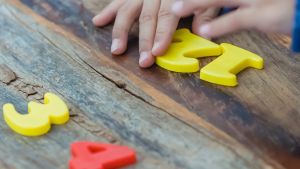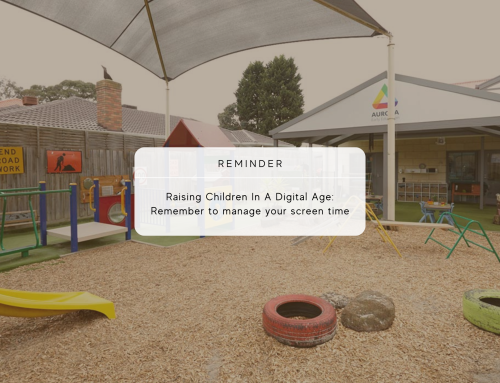At Aurora Early Childcare Education, we focus on equipping children with the life, academic and social skills to progress through their lives. Along with our regular educational program, we lay the foundation for important practical life skills that will help our children learn on their own now and later on in life as they mature. Financial knowledge is one of those practical life skills our children will certainly require later on in life and we aim to make them aware of it now so they gradually come to terms with the various aspects of financial management.
Maria Montessori emphasized the importance of learning practical life skills in her curriculum as it prepares children for their higher education, helps them adapt to different environments, and ingrains great inner satisfaction.
Early education has greatly evolved overtime to find the best methods suited to children in today’s world. With proper research and practice, we see that through different approaches to learning, our children can further connect with their world and develop healthy imaginations, understanding, and co-operation rapidly compared to previous methods.
A recent article published by The Conversation explored the lack of financial awareness in young people in Australia and how educational curricula are not benefiting the situation. Therefore, we should take this opportunity to provide the information needed at the earliest stage to help our children form an understanding of finances and dealing with them in the future.
Why should we raise awareness on finances in early education?
It is often said that managing personal finances are never taught enough in school, hence we trust it is beneficial to embed financial habits at an early age. We also believe in sparking passions and interests in our children and things they may find meaningful to them. Accordingly, in case they may find interest in dealing with finances through games, observation, television and movies, we can support them by explaining what it is and how to be careful with it.
It is imperative and in their best interest that we teach them how to care for money responsibly and understand its value as well as the potential consequences of using it irresponsibly. This aids them in building an understanding of the economy which will help them make fewer mistakes later on in life.
The book “Barefoot Investor” found that most individuals do not learn essential financial skills in school which has resulted in inadequate financial literacy in the country. The author, Scott Pape, now has a petition to provoke a financial revolution in schools.
Embedding financial literacy and starting the conversation about finances now will only aid our children in being responsible members of society when they are older so they are able to grasp concepts and make wiser decisions for their economy.
How can we introduce financial literacy to our children?
We can slowly introduce the concept of dealing with finances in a variety of ways. For instance through play-based learning, receiving allowances, shopping trips, and doing chores for a monetary reward.
- Learning through play

Aurora believes that in a child’s early years, pre kinder is best obtained through love and play whereby our children feel loved, safe and comfortable in our environment which then allows them to play and learn prosperously.
There are numerous games available that help children understand the value of money and how to manage it. For example, monopoly, the game of life, payday and much more. Although, for younger children, playing grocery store checkout, counting coins, and Peppa Pig’s money counter are great starter games to introduce financial literacy to children. This gives them some experience dealing with money that belongs to them that they have to use and see how easy it is to misuse it. Games will essentially motivate children to make wiser decisions when it comes to money.
- Giving them an allowance
Giving children a regular allowance helps in teaching them how to save and manage their own personal finances. Once they get their allowance and the freedom to do what they want with it, they will soon learn, through their experiences of using it or saving it, the benefits and consequences that come along with this sort of freedom and responsibility.
In early childhood, an allowance maybe a dollar a month that they can place in a piggy bank and make choices to spend.
- Go shopping
It is instrumental to make shopping a teachable moment and let children observe how adults make purchases as it helps them grasp the concept of spending and budgeting in accordance with what needs to be bought. Once they understand the value of different kinds of items they can then recognize how much certain things are worth when they have to spend their own money.
Moreover, with the allowance they get on a regular basis, parents can give their children the responsibility of spending a certain amount of that money when shopping either at a grocery store or a toy store to buy whatever they want, however, it has to be within that budget.
- Working for money

In addition to these options, it is also helpful to give children small chores to aid them in understanding the value of money by performing tasks worth monetary benefits. Research shows that when children are given some responsibility to look after their surroundings and themselves, their minds are able to process information at a higher rate. Thus, giving them a small salary for certain chores will motivate them to work better and be more productive.
Not only does encouraging participation in day-to-day tasks help our children become more responsible, but it also instils a healthy desire to be part of the real world whilst caring for it. Performing household tasks also helps them understand that good behaviour usually gets rewarded and therefore will persuade them to continue behaving in a good manner.
On the whole, our goal is to guide our children the best way we can so they are prepared for the real world and will be able to take care of themselves. Therefore, we work towards that goal at the earliest stage and continue to build on it from there so the process is natural, gradual, and effective.
Have a trip to our Kindergarten in Rowville and Kindergarten in Doncaster.
Sources
https://www.westconsincu.org/about-us/connect/blog/910/6-ways-to-teach-financial-literacy-to-kids/
https://www.financialeducatorscouncil.org/financial-literacy-for-kids/
https://www.onpointcu.com/blog/financial-literacy-starts-in-early-childhood/
https://www.kidsfinancialeducation.com/a-step-by-step-guide-to-financial-literacy-for-kids/
https://www.ramseysolutions.com/relationships/why-kids-need-value-hard-work





